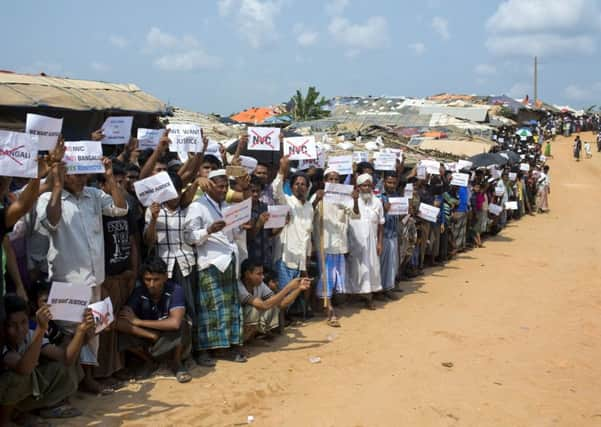Alistair Burt: How Britain is striving to end the Rohingya crisis


UK aid, in partnership with the government of Bangladesh and the international community, is now helping Rohingya families in the Cox’s Bazar camps to build shelters which are offering enhanced and sturdier protection to the Rohingya people during the rainy season.
But while UK aid and Bangladeshi generosity is helping address the immediate needs of the million displaced Rohingya people, we must start laying the foundations for the future and their eventual return to Burma.
Advertisement
Hide AdAdvertisement
Hide AdTo ensure their return is safe, voluntary and dignified requires three key actions.
First, the Burmese authorities must immediately step up their efforts to create the right conditions in northern Rakhine State for the Rohingya to return.
The British government believes this can only happen if Burma implements the recommendations of the late Kofi Annan’s Rakhine Advisory Commission.
This means addressing the causes of the crisis and permitting direct and unrestricted access for UN agencies, as well as dealing with issues such as citizenship rights for Rohingya and guaranteeing their freedom of movement now and in the future.
Advertisement
Hide AdAdvertisement
Hide AdSecond, the international community must increase its contributions and commitment to the long-term safety and wellbeing of the Rohingya people. The UN’s Joint Response Plan for the crisis called for $950m from the international community in March. Only a third of that target has been achieved so far.
The UK has led the international humanitarian response, committing £129m to meet the urgent needs of Rohingya refugees in Cox’s Bazar including food, shelter, clean water, health and sanitation.
But we need other governments and international donors to step up and provide more support.
We cannot allow the burden to fall on Bangladesh and local communities, not only because of fairness, but because it risks stoking social and political tensions and endangering the incredible economic progress Bangladesh has made in recent years.
Advertisement
Hide AdAdvertisement
Hide AdThirdly, there must not be impunity for those who commit the most serious crimes of international concern.
Two weeks ago, a UN Fact Finding Mission published its interim report providing insight into the appalling human rights violations by the Burmese military.
I wholeheartedly commend the UN Fact Finding Mission for their work.
Their findings cannot be ignored, in particular that there is sufficient grounds for an investigation to be launched into Burma’s top military generals for genocide.
Advertisement
Hide AdAdvertisement
Hide AdThe UK has already been working with local and international partners to help victims.
The British government was also instrumental in securing EU sanctions against seven individuals in the Burmese military, who can be directly linked to the appalling violence in northern Rakhine last year.
Britain is committed to ensuring the long-term safety of the Rohingya people and their eventual return to Burma.
While we must plan for the future, the immediate humanitarian challenges are far from over. Over the past two months, heavy monsoon rains have raised the risk of flooding, landslides and water-borne diseases in what is now one of the world’s biggest refugee camps.
Advertisement
Hide AdAdvertisement
Hide AdOur best hope of meeting those challenges is by building better foundations and we do that by creating stronger partnerships with UN agencies and local and international NGOs.
As this protracted crisis moves into another year, the UK will continue working with the government of Bangladesh and our partners to deliver life-saving solutions for the Rohingya people.
And to the Rohingya people living in the UK who are watching this crisis from afar as their friends, neighbours and relatives go through unimaginable suffering – the Rohingya community in Bradford is 400 strong and the largest in Europe – please be reassured that the UK is doing all that it can to protect and support your loved ones.
Alistair Burt is the International Development Minister.